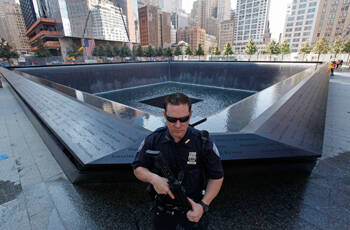Achieving a proper balance between security and liberty has never been more important, or more of a challenge, than in the years following the terrorist attacks of Sept. 11, 2001. Understanding the trade-offs and risks of these competing public interests requires a robust and informed public debate. Unfortunately, the U.S. public continues to operate in the dark about liberty’s losses and security’s gains as domestic intelligence gathering has accelerated over the last decade.
The latest evidence of the nation’s unhealthy lack of discussion has come courtesy of a commendable Associated Press investigation into the surprising reach of the antiterrorism efforts of the New York Police Department. The city’s “local” police department has branched out across the country and the world and within the walls of Islamic houses of worship and Muslim student groups in a vast terrorism interdiction program. It has been assisted in its antiterrorism fight with guidance and training by the Central Intelligence Agency. This collaboration may not be technically illegal—it comes close—but it clearly mocks legal restraints on domestic intelligence gathering by the agency.
In an attempt to establish an early warning network aimed at intercepting another 9/11-style attack, the police have deployed surveillance teams in nearly all the city’s bordering states and even overseas. It must be acknowledged that the city’s police are in an unenviable situation. It is not likely that concerns about the sanctity of privacy and the First Amendment will matter much if homegrown or international terrorists stage another attack on New York. All the same, the complete lack of public scrutiny of the N.Y.P.D. program and a shocking lack of oversight from any controlling state or federal or judicial authority is troubling.
The N.Y.P.D. has dispatched undercover officers into “suspect” neighborhoods as part of a “human mapping” program, monitoring daily life in bookstores, bars, cafes and nightclubs. The program’s operating rules prohibit police from basing investigations on religion, but in practice it is hard to see how such a guideline has been or even can be respected. During a cultural moment when presumed threats to religious liberty have been frequently cited, these indisputable intrusions have persisted with little comment, as New York police dispatch informants into mosques to monitor the sermons of religious leaders across the Northeast.
Informants and undercover officers have similarly infiltrated Islamic student groups; police trawl Web sites and blogs, eavesdrop on private conversations in hookah bars and cafes and maintain a database recording where Muslims live and work, where they pray and how often, even where they watch sports. In this world of meta-surveillance, investigators seek to filter out small threat indicators that can lead in turn to more targeted surveillance. This paradigm completely inverts evidence-based police work, converting all members of a targeted community, bookstore, coffee shop or mosque into possible criminals and employing secret-police style practices.
In the past, the Federal Bureau of Investigation, the C.I.A. and metropolitan police Red Squads infiltrated and harassed political targets—U.S. socialists, Black Panthers and antiwar activists—in the course of intrusions on civil liberties that were eventually turned back by court decrees and Congressional investigations. The current N.Y.P.D. effort could not have been undertaken, in fact, without the relaxation in 2003 of elements of the Handschu agreement. That 1985 court decree prohibited police investigation of political expression in the absence of evidence of a crime. Legislative or judicial review of the current intelligence-gathering program—and others like it that may be running silently around the country—appears warranted. Targets for such a review should include parallel efforts by the F.B.I. and the domestic consulting and intelligence franchising undertaken by the C.I.A.
Challenged last month by Columbia University students who wondered if they were still under police surveillance, Police Commissioner Raymond W. Kelly would say only, “We’re going to continue to do what we have to do to protect the city.” Defending the police department’s efforts, Mayor Michael R. Bloomberg repeated that the department’s monitoring of Muslims is “legal,” “appropriate” and “constitutional.”
Mayor Bloomberg seems to presume that the public should simply take him at his word, and Police Commissioner Kelly offers up a rationalization that does not appear to preclude, well, anything. This is unacceptable. The U.S. public has a right to understand what is being done in the name of its security. It needs to have a voice in establishing an equilibrium between public safety and constitutional privileges clearly taken for granted for too long.









http://en.wikipedia.org/wiki/1993_World_Trade_Center_bombing
"Ramiz Yousef set up residence on Nicole Pickett Avenue[citation needed] in Jersey City, New Jersey, traveled around New York and New Jersey and called Sheik Omar Abdel Rahman, a controversial blind Muslim cleric, via cell phone. After being introduced to his co-conspirators by Abdel Rahman at the latter's Al-Farooq Mosque in Brooklyn, Yousef began assembling the 1,500 lb (680 kg) urea nitrate–hydrogen gas enhanced device for delivery to the WTC."
Is there any common thread with the NYPD investigation? One could start with New Jersey, Islamic terrorists, an imam, mosques to name a few. The conclusion should be that the NYPD would be derelict in their in their duty to defend and protect if they were not conducting undercover surveillance of the people and places that carried out the WTC bombings.
Furthermore there is no need for the NYPD to reveal the public and the enemy, the who, what ,when and how undercover surveillance took place or will take place in the future otherwise it will not be undercover.